Antioxidants in antidiabetic drugs may fuel tumor spread: study
Updated: 2016-04-14 10:35
(Xinhua)
|
||||||||
 |
|
Scantily clad runners attend a fundraising event called Cupid's Undie Run for the Children's Tumor Foundation in front of Capitol Hill in Washington DC, Feb 15, 2015. [Photo/Xinhua] |
WASHINGTON - Some compounds in antidiabetic drugs known as antioxidants may fuel the spread of tumor, a study led by Chinese researchers said Wednesday.
The study, published in the US journal Science Translational Medicine, suggested that antioxidants may need to be administered with caution in diabetic patients with cancer.
Diabetes is suspected to raise the risk of many cancers, and the number of diabetic patients who also have cancer is growing, but how antidiabetic drugs affect cancer is poorly understood, said the study led by Hongting Zheng and Shicang Yu of the Third Military Medical University in Chongqing, China.
Antioxidants, compounds that protect cells from toxic reactive oxygen species, are commonly used to treat patients with diabetes, but mounting evidence from animal studies highlights the potential of these drugs to accelerate either cancer growth or metastasis.
In the new study, the researchers studied the effects of two common classes of antidiabetic medications with antioxidant properties in mice with colon and liver cancers.
The researchers found that while these drugs did not raise the risk of developing cancers, they sped the spread of existing tumors.
Further research revealed that the drugs activated the so-called NRF2 signaling pathway, which accelerated tumor metastasis.
If proven in humans, the findings would caution against giving this type of antioxidant-containing medication to diabetic cancer patients.
"Our results challenge traditional views on the use of antioxidants, which thought that these drugs protect cells from damage caused by free oxygen radicals, reducing the risk of tumorigenesis and improving the prognosis of cancer patients," Zheng and Yu said in an email to Xinhua.
"However, our study found that antioxidants may have a negative effect in certain circumstances, suggesting that we cannot abuse antioxidants."
- Diabetes risk rising for both children and adults
- 422 million adults live with diabetes, UN health agency says
- Scientists Make Progress Toward Better Diabetes Treatment, Cure
- HK experts warn diabetes patients of higher pancreatic cancer risk
- Homemade meals reduce risk of type 2 diabetes: study
- Diabetes diagnosis and treatments in urgent need of improvement in Karamay
- 12-year-old gets diabetes from eating fast food every day
- Lifestyle choices key to curbing China’s diabetes

 Thank you Kobe, say Chinese fans in countdown to retirement
Thank you Kobe, say Chinese fans in countdown to retirement
 3D printers from China at New York show
3D printers from China at New York show
 UN takes historic step to open selection of new UN chief
UN takes historic step to open selection of new UN chief
 Palace Museum stages peony-themed exhibition
Palace Museum stages peony-themed exhibition
 Man abducted 19 years ago reunites with family
Man abducted 19 years ago reunites with family
 Now and then: Technologies improve media work
Now and then: Technologies improve media work
 Unforgettable wedding photos at fire station
Unforgettable wedding photos at fire station
 Jack Ma toasts wine with Italy's prime minister
Jack Ma toasts wine with Italy's prime minister
Most Viewed
Editor's Picks

|

|

|

|

|

|
Today's Top News
Duke alumni visit Chinese Embassy
Marriott unlikely to top Anbang offer for Starwood: Observers
Chinese biopharma debuts on Nasdaq
What ends Jeb Bush's White House hopes
Investigation for Nicolas's campaign
Will US-ASEAN meeting be good for region?
Accentuate the positive in Sino-US relations
Dangerous games on peninsula will have no winner
US Weekly

|

|







